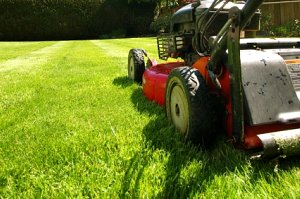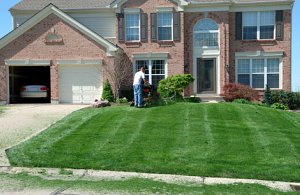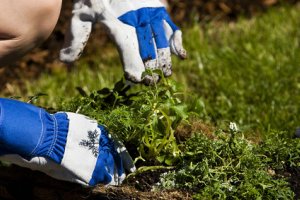Our top 10 organic lawn care tips revolve around sound maintenance practices. We call it “preventive health care for lawns”. It’s the simplest way to grow a healthy, natural lawn without using chemicals.
Forget about organic pesticide products, recipes and home remedies for natural bug and weed killers. A lush, green lawn is the best defense against pests: weeds, insects and disease.
Some of the links in this article are affiliate links. This means if you click on the link and purchase the item, I will receive an affiliate commission at no extra cost to you. All opinions remain my own. PLEASE READ MY DISCLOSURE FOR MORE INFORMATION.
What we cover
ToggleThe Secrets to Growing Beautiful Natural Lawns
- It’s all about the roots!
- Healthy soils produce healthy plants.
A tough, pest-resistant lawn will have a strong, deep root system. The key to organic lawn care is encouraging healthy root development through sound maintenance practices.

Our Top 10 Organic Lawn Care Tips

1. Mow High and Frequently
Mowing too short or removing too much all at once will reduce grass vigor.
There is a relationship between cutting height and rooting depth. Mow high to encourage deep rooting. See Lawn Mowing Tips for a table of cutting heights.
Follow the 1/3 Rule: Cut your lawn often enough so no more than 1/3 of the grass height is removed at any single cutting. For example, If your mowing height is 2 inches – mow the grass when it is 3 inches tall.
Other important lawn mowing practices include: recycling grass clippings, keeping mower blades sharp, and protecting our rivers and lakes by cleaning up grass clippings.
2. Grasscyling -- Recycling Grass Clippings
Grasscycling is mulching or simply leaving grass clippings on your lawn to decompose naturally. Doing this reduces yard waste and recycles nutrients. Did you know that about 25% of the nitrogen in your lawn fertilizer is removed with grass clippings?
3. Take a Soil Test
A soil test will tell you if you need to add fertilizer, lime or gypsum. It is a good indicator of soil health and should be done at least every three years.
Have you heard about the Sunday Smart Lawn Plan? It’s simple, do-it-yourself natural lawn care that’s customized to your soil, climate, and lawn. Delivered to you right when you need it.
Use coupon code BLC20 to Get $20 off + a FREE Soil Test
4. Use Organic Lawn Fertilizers
The purpose of fertilizing is to add nutrients that are required for healthy grass growth. Organic lawn fertilizers add organic matter to the soil, this improves soil structure and stimulates microbial activity.
They also release nutrients slowly, reducing the chances of salt damage (burn) to grass plants and minimizing the risk of nutrients polluting waters by runoff or leaching.
What is the best organic lawn fertilizer? The smartest way to make that decision is based on the actual cost of nutrients. That being said, a couple of my favorite products are Ringer® Lawn Restore®, Milorganite®, and Perfect Blend Biotic Fertilizers.

5. Water Smart -- Deep and Infrequently to Improve Drought Tolerance
Watering your lawn to supplement rainfall, encourage deep rooting, and conserve water is the key to a sustainable lawn care program.
Irrigate deep and infrequently to encourage deep, strong roots. Ideally, you’ll keep the soil moist to a depth of 5 or 6 inches. Watering two or three times a week is much better than watering every day. Daily irrigation causes shallow rooting and wastes water.
1 to 1 1/2 inches of rainwater per week is all a lawn needs. However, this is the general amount, your climate and grass type ultimately determine how much to water.
6. Aerate and Overseed
Your lawn should be aerated at least once a year…twice is better. Core aeration helps improve root strength, vigor and depth by reducing surface compaction and encouraging air, water and nutrients to seep down to the roots. Aerating also helps to break down the thatch layer.
Overseeding is an important cultural practice that should be included in your lawn maintenance program — combined with aeration.
7. Don't Rake Leaves
Mulch them with a mower instead. Leaves are a source of important nutrients and mulching them into the grass recycles these nutrients. Raking, bagging, hauling, dumping in a landfill or burning leaves is also a waste of time and energy and frankly, is kind of silly.
I realize that many appreciate a clean and leaf-free lawn and the leaf residue will be noticeable after mulching leaves, but in a couple of weeks the shredded leaves will sift into the lawn and will be barely noticeable.
If you must bag leaves, add them to a compost pile instead of hauling them to the landfill.
8. Compost Topdressing
Topdressing with compost once a year improves the soil by adding organic matter and nutrients. Another benefit: the soil microorganisms in compost break down thatch. The best time to topdress is in the fall or spring after the lawn has been aerated.

9. Choose the Best Grass Type
Before planting a new lawn, evaluate the site conditions and choose the best grass type for your area.
A grass species that’s adapted to your climate makes all the difference in tolerating environmental stress and pests.
10. Organic Weed Control
The least popular tip has been saved for last…
There really are no effective natural weed killers for lawns. Corn gluten meal is often used as a weed pre-emergence, but the results are inconsistent. Other products are non-selective — they will injure grass and weeds.
The best natural weed killer is pulling them, I recommend using a pair of gloves and a weeding tool. Weed seeds require contact with soil, sunlight and moisture to sprout and survive.
Therefore, the ultimate organic weed control program is to prevent weeds by growing a healthy, dense lawn that keeps weeds from the light, water and space they need to grow.
You might like these related pages
Chemical Fertilizers vs. Organic lawn Fertilizers
Are natural organic fertilizers safer than chemical fertilizers? Are they better or safer for lawns, the environment, and your family? Do synthetic sources of nutrients harm the soil?
Vinegar Weed Killer vs. Roundup
Why your recipe for homemade vinegar weed killer won’t work. Glyphosate is a more effective and safe non-selective herbicide. Helpful DIY lawn care tips and advice. Organic weed control and more.
Corn Gluten Meal – Natural Weed and Feed for Lawns
Corn Gluten Meal has been touted as a natural weed and feed – a pre-emergent crabgrass preventer. Is it effective? Or simply a good source of slow-release nitrogen.
